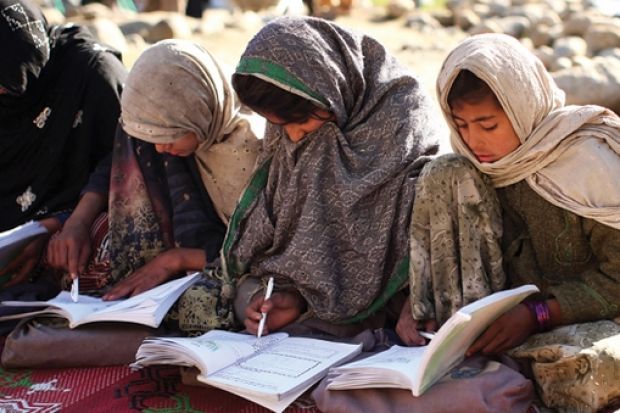A member of the Afghan parliament is attempting to level the playing field to ensure that female students from the country's more remote and unstable provinces have the same access to higher education as their urban-educated peers. Mujeeb u-Rehman Chamkani, an MP for Paktia, a remote, mountainous and unsettled province in southeast Afghanistan, is pressuring the government to implement a policy that will automatically grant extra points to young women from remote provinces sitting university entrance examinations. Violence in the more volatile, distant and poor provinces of Afghanistan, especially in the east and south, prevents many children from attending school.
Even when the young have access to education in these areas, they often lack high-quality teachers and facilities.
This puts them at a disadvantage when they come to compete for places at university with those who have been educated in Kabul and the country's other urban centres. The latter group not only have access to Afghanistan's best teachers but also to after-school entrance exam preparation courses.
Girls are at an even bigger disadvantage because cultural and social norms stop many from attending secondary school. Dr Chamkani last year successfully lobbied Hamid Karzai, Afghanistan's president, to help Paktia's young women. Mr Karzai instructed the Ministry of Higher Education to add an extra 20 points to the entrance exam scores of women from remote provinces.
His initiative ultimately helped not only young women from Paktia but also from Helmand, Kandahar and Ghazni. Dr Chamkani is attempting to have the initiative repeated this year. On 28 January, 75 young women from Paktia sat university entrance exams along with thousands of male students.
"If the Ministry of Higher Education sticks to the standards (for admissions), it is clear that girls from Paktia will not get a higher education," Dr Chamkani said in an interview at his home in Kabul.
He insisted that he is not asking for anything illegal and that women have a right to education.
"The constitution of Afghanistan says that development should be equal," he said. "If there is no security in Paktia, if there are no professional teachers in Paktia, that is not the problem of those girls."
Dr Chamkani denied that the women who were helped into university would struggle once there.
"Just because the girls get lower scores, it does not mean they are not talented or clever," he said, adding that he was convinced they would apply themselves with the vigour needed if they simply got the chance to attend university. However, there has been resistance to the initiative in Afghanistan's governing Council of Ministers, mainly because of tribal and ethnic rivalries within the government, Dr Chamkani said.
As access to education is more difficult in the unsettled Pashtun "belt" of the country, it is mainly Pashtuns who will benefit from the scheme.
This is something that members of other ethnic groups in the government are unhappy about. "I am trying my best to make them understand that this is in the best interests of all Afghans," Dr Chamkani said.
Register to continue
Why register?
- Registration is free and only takes a moment
- Once registered, you can read 3 articles a month
- Sign up for our newsletter
Subscribe
Or subscribe for unlimited access to:
- Unlimited access to news, views, insights & reviews
- Digital editions
- Digital access to THE’s university and college rankings analysis
Already registered or a current subscriber?
